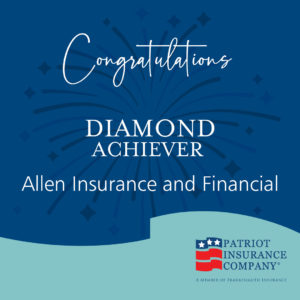Allen Insurance and Financial has been named Maine’s 2020 Diamond Achiever by Patriot Insurance Company. The annual award is presented to the highest performing agency based on set criteria including length of appointment, profitability, growth, and policy retention. Each year, the top Patriot Insurance Company agencies receive the “Diamond Achiever” award in recognition of their outstanding accomplishment.
Patriot Insurance Company President and CEO, Lincoln Merrill Jr. explains, “We are proud to present Allen Insurance and Financial with our Diamond Achiever award. Through their hard work and commitment to providing superior services, support and products, it is well deserved.”
This recognition exemplifies their commitment to providing quality, professional insurance products and services to our mutual clients.
The results achieved by the team at Allen Insurance and Financial helped the agency become one of the most successful among Patriot Insurance Company’s more than 115 independent agencies.
“The team at Allen Insurance and Financial is dedicated to providing the protection our clients need accompanied by the highest level of service. We are all very proud to be recognized by our colleagues at Patriot Insurance. Strong partnerships like ours benefit everyone in the industry − carriers, agents and clients, ” said Michael Dufour, executive vice president of Allen Insurance and Financial.
Allen Insurance and Financial has been licensed with Patriot Insurance Company since 1993 is recognized as one of the carrier’s Preferred independent insurance agency partners.
About Patriot Insurance
Patriot Insurance has been providing peace of mind for families and businesses in New England for over 50 years. Headquartered in Yarmouth, Maine, we are a regional carrier offering business, home, auto, life, and surety products backed by local, autonomous claims, loss control, and underwriting teams.
We work exclusively with independent agents who can give our customers the personal guidance and service they deserve. Since 2007, we have partnered with Frankenmuth Insurance, a longstanding company founded in Michigan in 1868. Patriot Insurance is financially sound, with an A.M. Best rating of “A” (Excellent).









